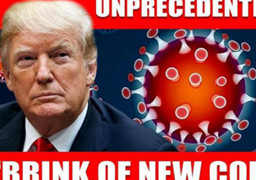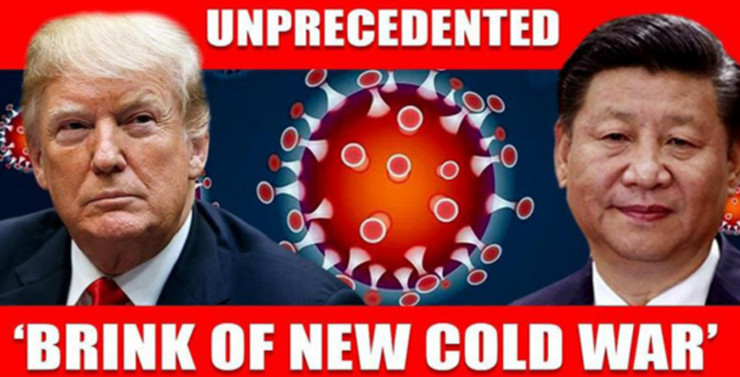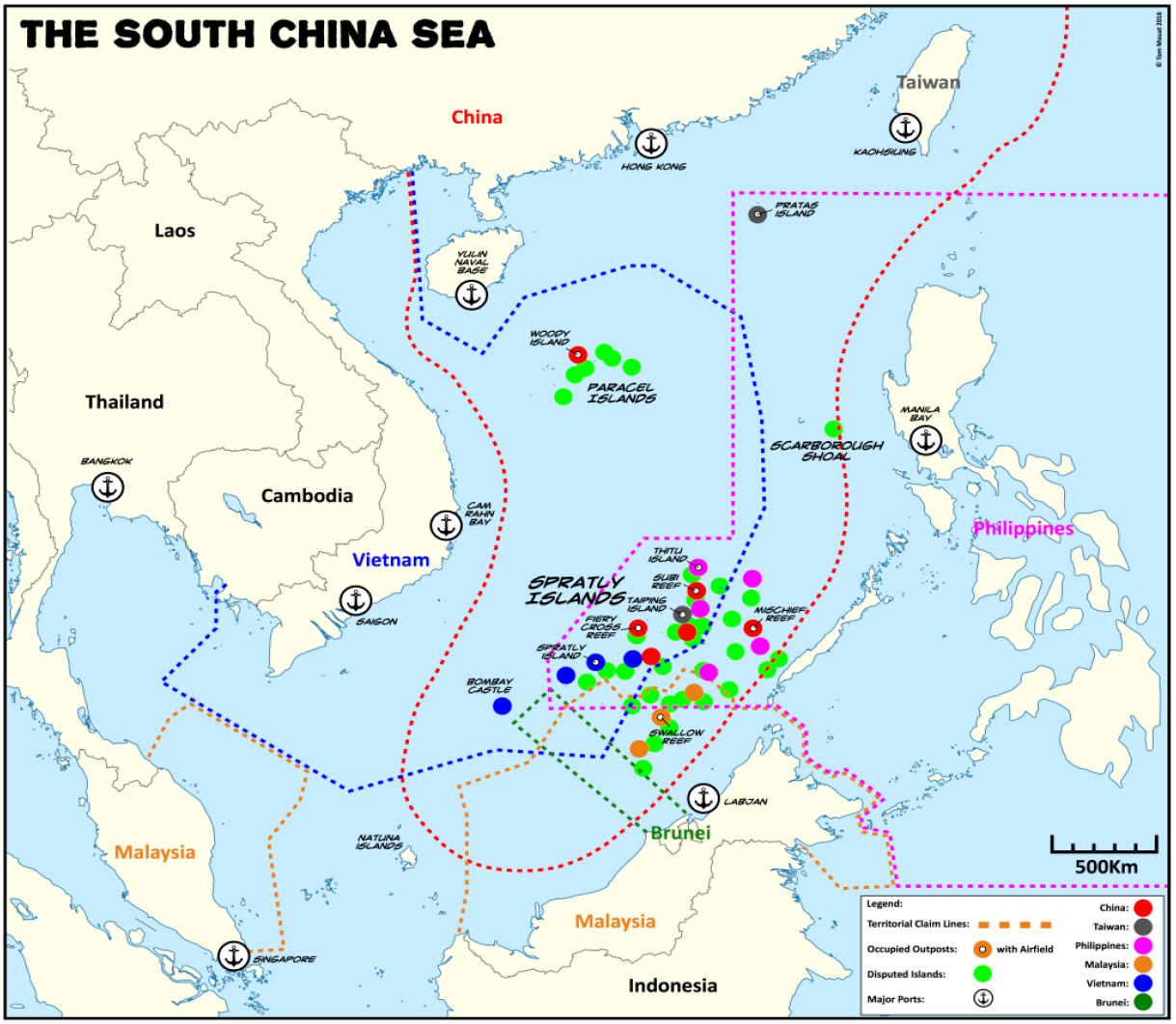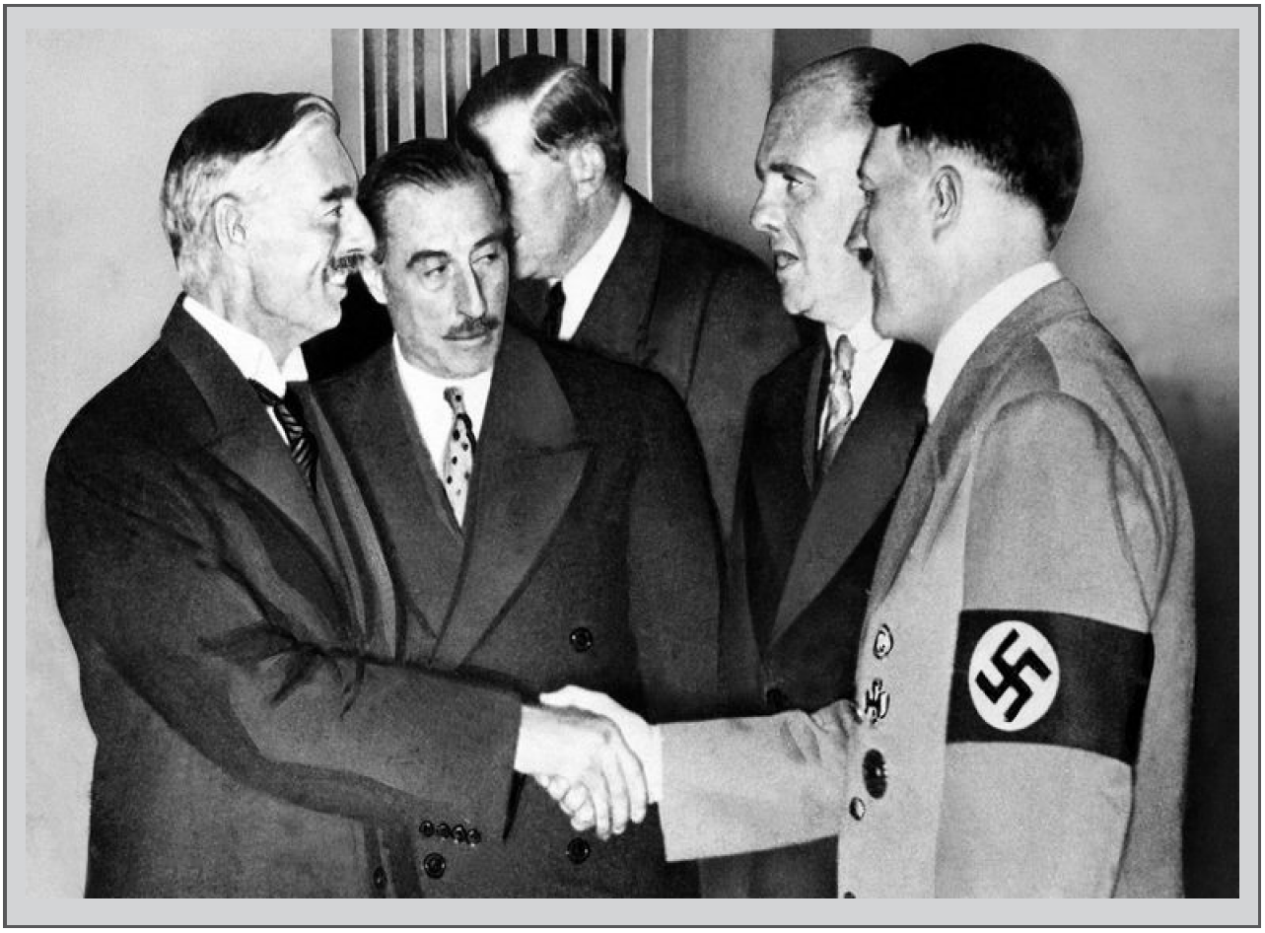




 |
 |
 |
|||
 |
 |
 |
 |
 | |
 |
 |
 | |


| 글로벌 트렌드 | 내서재담기 |


  |
 |  |
홍콩에서 대만, 남중국해에 이르기까지 오늘날 중국은 점점 더 세계에 과감하게 그들의 힘을 드러내려 하고 있다. 그러나 이러한 중국에 대한 미국의 견제는 더욱 더 강력해지고 있다. 미국은 동맹국들이 모두 이 견제에 참여하길 바란다. 두 초강대국 간의 갈등 속에서 앞으로 어떤 일들이 일어날 것인가?

코로나19 바이러스 대유행, 이와 동시에 발생하고 있는 사회적 불안으로 인한 최근의 혼란스러운 상황은 하나의 연막(smokescreen)인 것 같다. 이 연막은 오늘날 가장 중요한 지정학적 사건, 즉 ‘마중 냉전의 시작’을 대중의 눈에 잠깐 동안 보이지 않게 하고 있다.
사실 미국이 제2차 세계 대전에 갑자기 참여한 것과 마찬가지로, 미중 냉전 또한 갑작스럽고 예기치 않게 닥친 일이다. 코로나19에 있어 중국의 역할(발병과 확산에 대한 책임)은 1941년 일본의 진주만 폭격과 유사할 수도 있다. 하지만 현재의 상황은 1938년 독일의 체코슬로바키아 병합과 훨씬 더 유사하다. 물론 대부분의 사람들은 이를 부정한다. 이들은 ‘지니를 다시 램프 속으로 넣고’ 싶어 한다. 이들은 단지 몇 번의 사과, 그리고 몇 번의 외교적 악수만으로 ‘좋았던 옛날’로 다시 돌아갈 수 있다고 믿는다.
1938년 9월 히틀러의 위장평화 공세에 속은, 뮌헨 회담에서의 챔버레인(Chamberlain)과 같이, 이들은 ‘조금만 더 달래줌으로써’ 날이 갈수록 덩치가 더 커지고 사나워지고 있는 ‘만족을 모르는’ 중국을 만족시켜줄 것이라고 믿는다.
그러나 사실을 냉정히 보자.
21세기 세계 초강대국 – 미국과 중국 – 간의 악화된 관계는 이미 심각한 위험 단계에 접어들었다. 중국 공산당은 과감하게도 아시아에서 전 세계로 발걸음을 옮기고 있다. 중국의 이러한 행보와 야망은 점점 더 아시아의 평화와 안보에, 그리고 미국의 핵심 국익에 위협이 되고 있다.
이미 늦었지만, 아직까지는 행동을 취할 시간은 있다. 미국과 동맹국들이 이 위협에 대처하는 데 필요한 전략을 실행하고 결의를 보여주는 여부가 향후 10년, 그리고 그 이후의 세계 질서를 결정할 것이다.
중국 공산당은 소셜 미디어와 수십억 달러 규모의 글로벌 선전 기구를 통해, 다국어로 24시간 내내 그들의 세 가지 메시지를 전 세계로 전파하고 있다.
1. 민주주의는 중국의 효율적인 독재에 비해 열등한 정부 체제이다.
2. 중국은 평화적, 이타적, 관용적 새 국가로서, 자신들을 필요로 하는 ‘세계를 돕고자’ 한다.
3. 미국은 코로나19와 같은 큰 문제에 효과적으로 대처할 수 없는 민주 국가의 전형을 보여 준다.
물론 코로나19가 중국의 과실로 전 세계로 퍼진 것에 대해서는 언급하지 않는다. 하지만 중국이 홍보하려는 자비와 조화의 메시지는 몇 가지 명백한 모순을 잉태하고 있다.
신장 위구르 무슬림 인구에 대한 잔인한 조치는 인류에 대한 범죄이고, 홍콩 시민의 자유와 민주주의 법치에 대한 공격은 국제 협정을 위반하는 것이다. 또한 선진국들의 기술을 탈취하거나, 산업 스파이를 국가 전략으로 추진하는 것은 그 자체로 세계에 대한 도전이며, 신 식민주의적 '부채 외교'와 정치적 부패를 착취하여 개발도상국의 핵심 인프라와 천연 자원을 빼앗아가고 있다. 특히, 세계 역사상 유례를 찾아보기 힘들 정도로 대담하고 포괄적이며 지속적인 기술 절도의 도움으로 군사 역량까지 강화하고 있다. 이는 아시아, 특히 남중국해에서 군사적 긴장과 위협을 형성하고 있다.
이러한 현실에 직면한 세계는 현재 매우 중요한 시점에 도달해 있다.
「파이낸셜 타임즈(Financial Times)」의 데이비드 필링(David Pilling)이 이미 2013년에 언급했듯, 덩샤오핑(Deng Xiaoping)은 옛 중국 속담 ‘도광양회(Hide your strength, Bide your time, 자신을 드러내지 않고 때를 기다리며 실력을 기른다)’ 인용을 즐겨했다. 2세대 미국의 학자들과 정책입안자들에게, 이 속담의 희망적 해석은 중국이 초강대국으로 평화롭게 부상할 것이고 2005년∼2006년 미 국무부 차관 로버트 졸릭 (Robert Zoellick)이 세계적 문제에 대한 ‘책임있는 이해 당사자’로 명명한 그러한 국가가 될 것이란 의미였다. 그러나 아시아 소사이어티(the Asia Soceity) 미중관계연구소(the Center of U.S.-China Relations) 소장이자 중국 전문 애널리스트인 오빌 쉘(Orville Schell)은 중국에 대한 미국의 반세기에 걸친 이러한 ‘참여 정책(engagement policy)’을 분석한 결과, “그 희망은 방치로 인해 2020년에 이르러 비극적으로 사라졌다”고 밝혔다.
미국 측에서 많은 실수가 있었지만, 이 희망이 사라진 주요 요인은 그러한 참여 정책의 현상 유지가 더 이상 중국과 중국 공산당, 혹은 시진핑의 이해관계에 더 이상 어떤 기여도 하지 않기 때문이다. 그러나 이것은 시진핑이 마오쩌둥 이후 시대의 다른 지도자들보다 국내적으로는 더 무자비하고, 세계적으로는 더 야망이 있기 때문이 아니다. 이는 중국으로부터 동등함과 호혜성을 결코 가져오지 못했던 ‘참여 정책’이 그 유용성의 기한을 진작부터 상실했기 때문이다. 또한 이는 7년 전 자신의 에세이에서 데이비드 필링이 언급한 옛 중국 속담에 답이 있다. 능력을 드러낼 때까지 능력을 비밀로 하라는 것이 그것이다. 아마도 중국은 이제 그 능력을 드러내는 그 순간이 도래했다고 믿는 것이 확실하다.
이것은 중국의 새로운 권위주의와 호전성의 표출로 명확하게 드러나고 있다. 최근 발생한 네 차례의 상황을 보자.
- 홍콩 자치권에 대한 협정 파기
- 중국 인민해방군의 군사 역량 확대
- 남중국해에 대한 중국군의 진출 및 군사적 과시
- 대만의 자유와 안정에 대한 점차 증가하는 위협
2020년 6월 30일 중국 공산당은 5월에 발표했지만 상세한 내용은 밝히지 않은 국가보안법(national security law)을 마침내 인용하여 홍콩의 민주화 열기에 압력을 가했다. 이 새로운 법은 홍콩에서 ‘분리 독립’, ‘전복’, ‘테러’ 또는 ‘외국 세력과의 공모’ 행위를 저지르고 있다고 의심받는 사람이면 누구나 체포할 수 있는 전권을 베이징 정부에게 부여한다. 이 법의 조항은 너무 광범위하여 국제헌장과 1984년 중영선언(Sino-British Declaration)에 보장된 홍콩인들의 시민권과 정치적 권리를 옹호하는 모든 사람 – 해외에서도 - 에게 적용될 수 있다. 절차적으로 이것은 홍콩의 법치에 대한 죽음을 의미하는데, 이 법은 베이징 당국이 지배하는 비밀위원회에 의해 집행될 것이고, 그들의 결정은 ‘사법적 검토를 따르지 않을 것’이기 때문이다. 그리고 법 위반에 대한 형벌에는 종신형이 포함될 수 있기 때문에 홍콩 시민들이 한 때 표현의 자유였던 권리를 행사하려고 시도하는 경우 언제든 이 법에 저촉받을 것이 분명해 보인다.
실제로, 법이 발효된 다음날 10명의 홍콩인들(15 세 소녀 포함)이 체포되었고, 시위 이후 또 다른 360명이 구금되었다. 아시아에서 가장 활발한 도시 중 하나였던 곳에 이제는 두려움이 활보하고 있다. 경찰이 용의자를 감시하거나 자산을 압수하는 데 수색 영장은 필요하지 않다. 현재 홍콩의 활동가들은 트위터 계정을 삭제하고, 누리꾼들은 포스팅된 뉴스를 사이트에서 삭제하고 있다. 서점은 고객이 정부의 스파이일 수 있다는 ‘편집증’으로 고통받고 있다. 「뉴욕 타임즈(New York Times)」는 1989년 천안문 광장의 학살을 기억하는 기념관이 전시물들을 디지털화하고 있다고 보도했다. 기념관 전시물들이 압수될 수 있다는 우려에서다.
확실한 것은 홍콩의 용감한 민주주의자들이 중국의 ‘약자 괴롭히기’에 쉽게 굴복하지 않을 것이란 점이다. 7월 중순, 60만 명이 넘는 사람들이 놀랍도록 체계적이고 잘 준비된 경선을 위해 등장했다. 이 경선은 민주화 캠프에 의해 조직되었는데, 9월 입법회(Legislative Council) 선거 후보를 선출하기 위함이다. 이 투표는 새로운 국가안보법을 위반한 것일 수 있다는 공식 경고를 무시하고 진행되었다. 시위는 계속되고 민주화 운동가들은 투표함과 거리에서 투쟁을 계속할 것을 맹세하고 있다. 그러나 이들의 전술은 이제 더 창의적이고 변칙적이어야 할 것 같다. 예를 들어, 명확한 저항 성명서를 대신하는 텅 빈 백지 상태의 포스터가 그것이다. 일부 반대인사들은 이미 떠났고, 압박이 더 강해지면 더 많은 사람들이 이민을 선택할 것이다. 베이징의 전략은 홍콩의 탄탄한 사회가 저항이 무익하다는 것을 깨닫게 될 때까지 두려움을 심어주고, 반대세력을 무너뜨리고, 복종을 강요하고, 망설이는 사람들을 끌어 들이고, 점차적으로 억압을 더 가하는 것이다. 이 전략이 홍콩에게 유일한 것이 아니다. 이는 아시아 전 지역에 대한 지배권을 확보하기 위한 중국의 수단이다.
홍콩을 복속시켰다고 믿는 중국은 다음 대상으로 남중국해를 바라보고 있다. 중국이 남중국해에 대한 영유권 주장의 근거로 삼고 있는 해상경계선 남해9단선(Nine-Dash Line)을 보자. 중국은 이 해역에서 85% 이상의 영유권을 부당하게 주장하고 있다. 여기에는 전 세계 해상 수송의 3분의 1이 통과하는 해로뿐만 아니라 이 해역의 풍부한 어류 및 광물 자원에 대한 권리도 포함되어 있다. 남해9단선 대부분은 중국 본토와는 멀리, 베트남, 말레이시아, 인도네시아, 필리핀과는 근접한 곳이다. 이는 중국의 광범위한 주장에 대해 필리핀이 국제 제소를 하여, 2016년 헤이그 상설 중재 재판소(the Permanent Court of Arbitration in The Hague)에서 인정한 부분이다. 그럼에도 불구하고 중국은 부분적으로 준설 모래로 섬을 만든 후 이를 군사 기지로 전환함으로써 남중국해를 군사화하는 데 수년간 골몰해오고 있다.

지정학 전문가 로버트 매닝(Robert Manning)과 패트릭 크로닌(Patrick Cronin)이 최근까지 조사한 바와 같이, 중국은 또한 중국의 해상 인접국들이 국제법에 보장된 그들 권리와 영토권을 포기하고, 현재 상황을 불가역적으로 변경하도록 강요하고 있다. 중국은 4월에 베트남 어선을 분쟁 수역에서 침몰시켰고, 다른 4개국의 어선들을 공격했다. 또한 말레이시아와 베트남의 배타적 경제 수역 내 위치한 해역에서의 원유 및 가스 시추 프로젝트를 위협하고 있다. 매닝과 크로닝은 해양에 대한 중국의 점진적인 위협과 괴롭힘은 ‘중국이 말레이시아와 베트남의 원유 및 가스 시추 프로젝트를 방해하고 점차적으로 더 목을 옥죄어, 이들의 영역권을 지우려고 시도하는 것’이라는 두려움을 불러 일으키고 있다.
오바마 행정부는 명목상 헤이그의 판결을 ‘최종적이고 구속력있는’ 것으로 지지했다. 하지만 이제는 보다 강력한 미국의 입장이 필요하다. 7월 초, 마이크 폼페이오 미 국무장관은 이 지역에 대한 중국의 영토 주장을 ‘완전히 불법’이라고 일축했고, 미 항공모함 2개 전단이 남중국해로 향했다.
이는 중국의 공격적 의도를 억제하고 방지하기 위해 계속 유지할 필요가 있는 활동이다. 중국이 지배권을 확대하기로 결정한 곳이 홍콩, 그리고 남중국해의 풍부하고 전략적인 해역에만 국한된 것이 아니기 때문이다. 중국이 항상 본토와 재결합해야하는 이탈 지역으로 주장해온 대만도 이에 포함된다. 마오쩌둥 이후 모든 중국 지도자들은 이 목표를 달성하겠다고 맹세해왔다. 그러나 도광양회를 언급했던 덩샤오핑 이후, 어떤 지도자도 대만 문제를 무력을 사용하여 해결하고자 하는 시도를 진지하게 고려하진 않았다. 그러나 이제 세 가지 이유로 이러한 상황에 변화가 일어날 수 있다.
첫째, 세계 무대에서 중국의 ‘도강양회’ 시대가 끝났다. 이제 중국은 전후 자유 질서를 뒤집고, 국제 제도와 규범을 재편하며, 아시아와 그 너머에서 힘의 균형을 재구축하려 한다.
둘째, 각각 두 번의 5년 임기 이후 권좌를 떠난 두 명의 전임자들과 달리, 시진핑은 임기 제한을 없애 종신 통치를 계획하고 있다. 따라서 그는 대만 문제를 그의 후임에게 넘겨줄 수도 없고, 중국의 야망에서 대만만 떼어 놓을 수도 없다. 자신의 정당성을 위해, 그리고 중국의 세계적 부상이라는 야망을 실현시키기 위해 대만이 완전 독립을 달성하기 이전에 본토에 귀속시켜야만 한다.
셋째, 시진핑은 침투(penetration), 선전(propaganda), 부패(corruption), 포섭(cooption)이라는 중국의 통일 전선(United Front) 전략이 대만을 서구로부터 멀어지게 하지 않음을 깨닫고 있을 수 있다. 이 시나리오는 2020년 1월 대만 총통 선거에서 베이징에 우호적인 국민당 후보 한궈위(Han Kuo-yu)의 압도적 패배 이후 특히 그 가능성이 낮아진 것으로 보인다. 그리고 한궈위가 가오슝(Kaohsiung) 시장으로서 주민소환투표에서 압도적 찬성으로 탄핵된 6월에 더욱 확실해졌다. 중국 공산당은 이제 상당한 돈, 잘못된 정보, 군사적 침투 혹은 강압으로는 대만을 그들 품으로 유인할 수 없다는 것을 감지했다. 특히 최근 홍콩에서 발생한 사건으로 ‘한 국가, 두 체제’의 아이디어가 기괴한 사기임이 입증된 이후 이는 사실이 되었다.
이러한 이유로 향후 수년은 적어도 베트남 전쟁 이후 아시아의 평화와 안보에 가장 큰 도전이 될 것이다. 「포린 어페어스(Foreign Affairs)」의 한 통찰력 있는 에세이에서, 국가안보위원회 아시아 부문 상임이사로 조지 W. 부시와 바락 오바마 대통령을 각각 보좌했던 마이클 그린(Michael Green)과 에반 메데이로스(Evan Medeiros)는 묻는다.
“대만은 제2의 홍콩인가?”
그란과 메데이로스는 ‘합병할 수 있다고 인지할 때, 이전 소유물을 합병하고자 하는 위협’은 더욱 중대된다고 예측한다. 예를 들어, 2014년 우크라이나를 침공하여 크림반도를 합병하기로 결정했을 때, 푸틴은 2008년 조지아 침공에서 그 교훈을 얻었다. 조지아에 대한 서구의 결정적인 반응이 부족했기 때문에 크림반도 침공에 대한 관대한 환경이 조성되었던 것이다. 그린과 메데이로스에 따르면, “중국은 ‘아시아에 대한 미래 침략 혹은 확대’를 고려할 때 홍콩에 대한 미국의 반응을 먼저 평가할 것”이라고 말했다. 주목해야 할 것은, 중국이 대만의 미래에 대한 공개 연설에서 ‘평화 통일’ 중 ‘평화’라는 단어를 이미 빼기 시작했다는 점이다.
이것은 중대한 역사적 유사성을 고려할 때 특히 더 불길하다. 1938년 9월 뮌헨 협정을 무효화하고 체코슬로바키아 전체를 점령했던 히틀러의 사례와 거의 같은 방법으로, 시진핑은 2047년까지 홍콩의 자치권을 약속하는 중영 공동 선언을 무효화했다. 미국 내 가장 존경받는 중국인 학자들 중 한 명은 최근 “나는 이제 홍콩을 체코슬로바키아로 본다. 대만에 대한 공격은 히틀러의 폴란드 침공과 같을 것”이라고 말했다.
긍정적으로 생각했던 사람들은 히틀러가 주데텐(Sudetenland)으로 불리는 체코슬로바키아의 일부영토에 만족할 것으로 판단했다. 그러나 히틀러는 폴란드를 침공했고, 그로부터 1 년이 채 되지 않아 거의 모든 서유럽을 점령하고 런던을 폭격할 준비를 했으며, 소련 침공까지 계획을 세웠다. 이후의 이야기는 누구나 알 듯 인류 역사상 가장 파괴적인 전쟁으로 이어졌다.

이것이 뮌헨 협정이 국제적 회유와 실수의 대명사가 된 이유이다. 이는 권위주의적 침략자를 회유하는 것보다 더 큰 어리석음은 없다는 것을 보여줬다. 그리고 이것이 현재 동아시아가 위태로운 이유다. 따라서 미국은 홍콩의 자치권과 민주적 권리를 지지하는 데 단호한 입장을 취해야한다. 미국을 비롯한 서구도 이러한 권리를 침해한 중국과 홍콩의 지도자들에 대한 상당한 제재를 가하는 것이 필요하다. 인도-태평양 지역과 나토(NATO)에 걸친 동맹국들이 협력해야 하는 이유이기도 하다. 이를 통해 중국이 주변국에게 가하는 괴롭힘과 압박에 대응하고, 개방된 해로를 확보하고, 분쟁의 평화적 해결을 모색해야 한다.
이에 우리는 현재의 상황을 고려하여 향후 다음과 같은 예측을 내려 본다.
첫째, 세계 각국은 공동의 이해와 가치를 바탕으로 세 그룹으로 각각 통합될 것이다.
한 그룹은 미국을 중심으로, 두 번째 그룹은 중국을 중심으로, 세 번째 그룹은 새로운 ‘비동맹’으로 두 초강대국간의 경쟁에서 이익을 취하려 할 것이다.
둘째, 미국은 압도적인 군사력과 경제력을 이용하여, 중국인민해방군이 대치 지역에서 물러나도록 계속 압력을 행사할 것이다.
이는 중국의 전략적 취약성에 초점을 맞추면서 미국과 그 동맹국들이 해상, 항공, 우주 전력 측면에서 보유하고 있는 방대하고 지속 가능한 질적 양적 이점을 군사적으로 활용하는 것을 의미한다.
셋째, 미국과 그 동맹국들은 홍콩과 관련된 조약 의무를 무효화한 것에 대해 중국이 험난한 대가를 치르게 할 것이다.
미국과 그 동맹국들은 경제 부문과 정치적 부문에서 모든 힘을 발휘할 것이다. 중국이 없는 세계를 상상할 수 없는 것처럼, OECD가 없는 중국 또한 상상할 수 없다. 중요한 것은 중국의 경우 OECD가 없는 경우, 중국의 현 지도부 혹은 공산당은 생존할 수 없을 것이란 점이다.
넷째, 중국과 그들 동맹국들에 대한 정치적, 경제적 스트레스가 심화되면, 중국에 진출한 다국적 기업의 이탈은 점점 더 가속화될 것이다. 이는 북미는 물론 동남아시아의 나머지 지역에 이익이 될 것이다.
몇몇 고가 브랜드를 제외하고, 중국 소비자 시장이 다국적 기업에 유리하게 조성된 경우는 거의 없었다. 더군다나 중국의 인건비는 계속 상승하고 있으며, 관세로 인해 수출도 상황이 나빠지고 있다. 이로 인해 대부분의 다국적 기업은 코로나19 팬데믹과 홍콩 탄압 이전부터 중국 시장에서 철수하거나 사업을 축소할 계획을 밝혔다. 외국계 기업들이 중국에 머무는 유일한 이유는 아마도 ‘매몰 비용’ 때문일 것이다. 결과적으로 중국으로부터의 이탈로 인한 글로벌 공급망의 재구성은 북미를 비롯한 다른 아시아 국가 경제에 새로운 활력이 될 것이다.
다섯째, 미중 갈등은 2020년 선거와 그 이후에도 미국에서 계속 중요한 이슈가 될 것이다.
코로나19 치료제와 백신이 출시되고 사망자가 줄어들면서, 미국은 좀 더 근본적인 문제를 해결하기 위해 집중할 것이다. 미국에서 사용되는 항생제를 비롯한 의약품뿐만 아니라 상당수 소비재를 중국에 의존하고 있는 구조적 문제뿐만 아니라, 사이버 전쟁, 산업 스파이 등을 좀 더 정교하고 집요하게 다루기 시작할 것이다.
여섯째, 대부분의 미국 기업과 소비자, 노동자들은 미중 갈등 및 신 냉전의 수혜자가 될 것이다.
1950년대와 1960년대 모두 냉전은 미국 경제에 유익하였다. 군사 기술의 발전이 민간 분야에 응용되어 거대한 산업을 창출해냈다. 컴퓨터와 인터넷은 그러한 사례 중 하나이다. 앞으로의 미중 갈등은 미국 내 제조업 일자리를 늘리고, 미국의 첨단기술 등 지적 자산이 절취되는 사례를 막아줄 것이다. 뱅크오브아메리카(Bank of America)의 분석에 따르면, 미국으로 돌아갈 제조업의 직접적인 일자리 창출은 수백만 개에 이르고, 이는 경제 전반에 걸쳐 6배의 간접적인 일자리를 창출하는 것으로 나타났다.
* *
References List :
1. The Atlantic. May 2020. R. McMaster. How China Sees the World And how we should see China.
https://www.theatlantic.com/magazine/archive/2020/05/mcmaster-china-strategy/609088/
2. MisInformation Review. June 8, 2020. Vanessa Molter & Renee Diresta. Pandemics & propaganda: how Chinese state media creates and propagates CCP coronavirus narratives.
https://misinforeview.hks.harvard.edu/article/pandemics-propaganda-how-chinese-state-media-creates-and-propagates-ccp-coronavirus-narratives/
3. Journal of Democracy. July 2020. Nedege Rolland. China’s Pandemic Power Play.
https://www.journalofdemocracy.org/articles/chinas-pandemic-power-play-2/
4. The American Interest. July 17, 2020. LARRY DIAMOND. The End of China’s “Peaceful Rise.”
https://www.the-american-interest.com/2020/07/17/the-end-of-chinas-peaceful-rise/
5. Hoover Institution Press. August 1, 2019. Larry Diamond & Orville Schell. China's Influence and American Interests: Promoting Constructive Vigilance.
https://www.amazon.com/Chinas-Influence-American-Interests-Constructive/dp/0817922857
6. Financial Times. December 11, 2013. David Pilling. No one is immune from Beijing’s ‘gravity machine.’
https://www.ft.com/content/32470bd8-619d-11e3-b7f1-00144feabdc0
7. The Wire China. JUNE 7, 2020. Orville Schell. The Death of Engagement.
https://www.thewirechina.com/2020/06/07/the-birth-life-and-death-of-engagement/
8. com June 30, 2020. Helen Regan. China passes sweeping Hong Kong national security law.
https://www.cnn.com/2020/06/29/china/hong-kong-national-security-law-passed-intl-hnk/index.html
9. The New York Times. July 1, 2020. In Hong Kong, Arrests and Fear Mark First Day of New Security Law.
https://www.nytimes.com/2020/07/01/world/asia/hong-kong-security-law-china.html
10. China Power. October 10, 2019. China Power Team. How much trade transits the South China Sea?
https://chinapower.csis.org/much-trade-transits-south-china-sea/#:~:text=The%20United%20Nations%20Conference%20on,one-third%20of%20global%20shipping
11. July 12, 2016. Stephen McDonell. South China Sea: Tribunal backs case against China brought by Philippines.
https://www.bbc.com/news/world-asia-china-36771749
12. Foreign Affairs. July 8, 2020. Michael Green and Evan Medeiros. Is Taiwan the Next Hong Kong?
https://www.foreignaffairs.com/articles/east-asia/2020-07-08/taiwan-next-hong-kong
 |  |
The West Confronts China
The recent disruption caused by the COVID19 pandemic and the simultaneous social unrest has acted as a “smokescreen,” diverting public attention from the most important geopolitical event of our lifetimes: the beginning of the Sino-American Cold War.
Much like U. S. involvement in World War II, the Sino-American Cold War has come upon us suddenly and unexpectedly. While China’s role in COVID19 may resemble the 1941 attack on Pearl Harbor, today’s “state of play” has far more resemblance to Germany’s 1938 annexation of Czechoslovakia. Now, as then, most people are in denial. They want to “put the genie back in the bottle.” They believe we can simply return to “the good old days,” with a few apologies and a few diplomatic handshakes. In short, like Chamberlain in Munich, they believe “just a little more appeasement” will satisfy an insatiable monster which has simply gotten bigger and fiercer with each passing day.
Consider the facts.
The deteriorating relationship between the world’s two 21st century superpowers—the United States and China—have already entered a period of grave danger. An emboldened Chinese Communist Party (or CCP) is on the move in Asia and globally. Increasingly, its behavior constitutes a threat to peace and security in Asia as well as a threat to the core national interests of the United States.
The hour is late, but there is still time to act. Whether the United States and its allies execute the strategy and display the resolve required to meet this threat will determine the world order in the coming decade and beyond.
Over social media and through its multi-billion-dollar global propaganda machine, the CCP now spreads a three-part message in multiple languages, 24-7. It says:
1. that democracy is an inferior system of government to China’s efficient dictatorship;
2. that China is a peaceful, selfless, and generous rising power, seeking merely to “help a world in need”; and
3. that the U.S. epitomizes the inability of democracies to cope effectively with big problems like COVID19 while failing to mention that the CCP’s own “negligence” (or malevolence) unleashed it on the world.
However, the message of “benevolence” and “harmony” that the Chinese Communist Party is trying to promote through its overt and covert global media operations is belied by several obvious contradictions.
First, the brutal subjugation of its Uighur Muslim population in Xinjiang which is literally “a crime against humanity.”
Second, its assault on civil liberties and the rule of law in Hong Kong, which violates international agreements.
Third, it so-called “sharp power” tactics designed to penetrate, corrupt, and coopt democratic institutions around the world.
Fourth, its neocolonial exploitation of “debt diplomacy” and political corruption to swindle developing countries out of their critical infrastructure and natural resources.
Fifth, the breathtaking pace of its military expansion and modernization, aided by the most audacious, comprehensive, and sustained campaign of technology theft in global history. And,
Sixth, its increasing military adventurism and belligerence in Asia, particularly in the South China Sea.
Faced with this reality, the modern world has arrived at a critical juncture in human history.
As David Pilling of the Financial Times observed in 2013, “Deng Xiaoping was fond of quoting the ancient Chinese proverb: ‘Hide your brightness, bide your time.’” For two generations of American scholars and policymakers, the hopeful interpretation of this phrase was that China would have a peaceful rise to great-power status, becoming what former Deputy Secretary of State Robert Zoellick termed “a responsible stakeholder” in global affairs. But as Orville Schell, one of America’s premier China watchers, concluded in a recent landmark analysis of nearly half a century of America’s “engagement policy” with China, “that hope died tragically in 2020 due to neglect.”
There were plenty of mistakes on the American side, but the key cause of death was that the status quo no longer served the interests of China, the CCP, or its leader, Xi Jinping. And this is not simply because Xi is more domestically ruthless and globally ambitious than any other leader of the post-Mao era. It is also because engagement, which never delivered equivalence and reciprocity from the Chinese side, had outlived its usefulness. In his prescient essay seven years ago, Pilling said of Deng’s famous quote that, “The idea was to keep China’s capabilities secret until the moment was right to reveal them.” Now, Chinese leaders clearly believe that moment has arrived.
This is unambiguously demonstrated by recent developments that signal a new authoritarian bravado and belligerence on the part of the CCP. And the four most worrisome aspects of this are
1. the betrayal of Beijing’s commitment to Hong Kong’s autonomy;
2. the escalating pace of militarization by the People’s Liberation Army (or PLA);
3. China’s military muscle-flexing in the South China Sea; and
4. the growing existential challenge to the freedom and security of Asia’s most liberal democracy, Taiwan.
On June 30, 2020, the CCP finally lowered the boom on Hong Kong, adopting the draconian national security law that it had announced, but not detailed, in May. The new law gives the government in Beijing carte blanche to arrest anyone in Hong Kong it claims is committing acts of “secession,” “subversion,” “terrorism,” or “collusion with foreign powers.” The language is so broad that it can apply to anyone (even abroad) who is advocating for the civil and political rights of Hong Kongers, as guaranteed both in international charters and in the 1984 Sino-British Declaration. Procedurally, this delivers the death knell to the rule of law in Hong Kong, since it will be enforced by a secretive committee, dominated by the Beijing authorities, whose decisions “shall not be amenable to judicial review.” And since the penalties for violating the law can include life in prison, it should be clear to the people of Hong Kong what they are up against if they continue to try to exercise what was once their rights of free expression.
Notably, on the day after the law went into effect, ten Hong Kongers were arrested under its provisions (including a 15-year-old girl), and another 360 were taken into custody as new protests erupted.
As a result, fear now stalks what has been one of Asia’s most civically vibrant cities. The police no longer need search warrants to monitor suspects or seize their assets. Activists are deleting their Twitter accounts and writers are deleting their posted articles from news sites. Booksellers confess to being “paranoid” that their customers could be government spies. And, the New York Times reports, “A museum that commemorates the 1989 Tiananmen Square massacre is rushing to digitize its archives, afraid its artifacts could be seized.”
To be sure, Hong Kong’s brave democrats are not simply bowing in the face of Beijing’s bullying. Over 600,000 people turned out in mid-July for a remarkably disciplined and well-staged primary election organized by the pro-democracy camp to choose its candidates for the September Legislative Council elections. The vote took place in defiance of official warnings that it might violate the new national security law. Protests continue, and pro-democracy activists vow to carry on the struggle at the ballot box and on the streets. But tactics must now be more creative and oblique (blank posters now sometimes stand in place of explicit statements of resistance). A few opposition figures have already left, and as the vise tightens, more people will emigrate. Beijing’s strategy is to instill fear, demoralize opposition, compel submission, coopt the wavering, and gradually increase repression until Hong Kong’s robust society realizes that resistance is futile. But this is not simply Beijing’s strategy for Hong Kong, it is the means by which it seeks to secure dominance over all of Asia.
Believing now that they have finally secured Hong Kong’s submission, China’s communist leaders are looking to the South China Sea as their next conquest. A cursory review of a map showing China’s so-called “Nine-Dash Line” reveals the absurdity of its sovereignty claims to over 85 percent of these waters, which include rich fishing and mineral rights, as well as sea routes through which one-third of all global shipping passes. Most of the Nine-Dash Line veers far from the Chinese mainland deep into the proximity of Vietnam, Malaysia, Indonesia, and the Philippines; this was recognized in 2016 by the Permanent Court of Arbitration in The Hague when it upheld a case brought by the Philippines against China’s expansive claims. Nevertheless, China has spent the last several years militarizing the South China Sea, in part by creating islands from dredged sand and then converting them into military bases.
As geopolitical experts Robert Manning and Patrick Cronin have recently observed, China has also been seeking “to coerce its maritime neighbors to abandon their claims and territorial rights under international law and irrevocably alter the status quo.” Increasingly, China harasses fishing boats from the other four countries, sinking a Vietnamese fishing boat in disputed waters in April. It also threatens oil and gas projects in waters that lie within the exclusive economic zones of Malaysia and Vietnam. The escalating maritime harassment, Manning, and Cronin write, is stoking fears “that China is trying to disrupt and gradually strangle Malaysian and Vietnamese oil and gas operations in the area and erase their territorial claims.”
Although the Obama Administration nominally backed the ruling in the Hague as “final and binding,” a more vigorous American posture is now needed. In early July, Secretary of State Mike Pompeo dismissed China’s territorial claims in the region as “completely unlawful,” while two American “aircraft carrier strike groups” sailed into the South China Sea. These are the kinds of actions that will need to continue in order to deter and contain China’s aggressive intent.
For it is not only Hong Kong and the rich, strategic waters of the South China Sea over which Beijing is determined to extend its dominance. It is also Taiwan, which the CCP leaders have always claimed is a renegade province that must be reunited with the mainland. Every Chinese leader since Mao has vowed to achieve this. But in the post-Deng era of “hiding strength and biding time,” no ruler seriously contemplated using force to resolve the question absent a declaration of independence from Taiwan. That may now be changing for three reasons.
First, the era of China’s communist leaders “biding their time” on the global stage is over. They now seek to upend the postwar liberal order, to remake international institutions and norms, and to restructure the balance of power in Asia and beyond.
Second, in contrast to his two predecessors, who left power after two five-year presidential terms, Xi has done away with term limits and plans to rule for life. Thus, he can no longer pass the Taiwan “problem” on to his successor and claim he “inched” the CCP’s prospects forward. For his domestic legitimacy, and to realize his ambitions for China’s global rise, he must “recover” Taiwan before it slips away. And,
Third, Xi may now realize that the “United Front” tactics of penetration, propaganda, corruption, and cooption will not pluck Taiwan away from the west. That scenario looks especially unlikely in the wake of the crushing defeat of the KMT Party’s Beijing-friendly presidential candidate, Han Kuo-yu, in Taiwan’s January 2020 presidential election; and this was further emphasized by Han’s ignominious “voter recall” from his position as Mayor of Kaohsiung. The CCP now senses that no amount of money, misinformation, infiltration, or coercion is going to lure Taiwan into the political arms of the CCP. And that’s particularly true after events in Hong Kong recently proved the idea of “one country, two systems” to be a grotesque fraud.
For these reasons, the coming years will present the greatest challenge to peace and security in Asia since at least the Vietnam War. In an important and insightful new Foreign Affairs essay, Michael Green and Evan Medeiros, who served Presidents George W. Bush and Barack Obama respectively, as National Security Council Senior Directors for Asia, ask “Is Taiwan the next Hong Kong?” They observe that the danger of countries annexing former possessions increases when they know they can get away with it. For instance, when “Putin decided to invade Ukraine and annex Crimea in 2014, he was drawing on lessons from his 2008 invasion of Georgia.” The lack of a decisive Western response in Georgia “created a permissive environment for the Crimean invasion.” According to Green and Medeiros, China’s leaders will weigh the U.S. response in Hong Kong when they consider “future aggression in Asia.” Notably, they have already begun dropping the “peaceful” part of “peaceful unification” in some of their public speeches about the future of Taiwan.
This is particularly ominous when we consider a momentous historical parallel: Hitler’s seizure of the whole of Czechoslovakia, obliterating the September 1938 Munich Agreement in much the same way Xi has negated the Sino-British Joint Declaration promising Hong Kong autonomy through 2047. One of America’s most respected China scholars recently stated, “I look at Hong Kong now as Czechoslovakia, and an assault on Taiwan would be the equivalent of Hitler’s invasion of Poland.”
Wishful thinkers thought Hitler would be satisfied with a part of Czechoslovakia called the Sudetenland. Next, they imagined he would be satisfied with the whole thing. But then he invaded Poland. And less than a year after that he had taken over almost all of Western Europe, was ready to bomb London and was planning to invade the Soviet Union. The rest of that story describes the most destructive war in human history.
That is why the Munich Agreement has ever since been synonymous with international appeasement and blunder. It shows that there is no greater folly than trying to appease an authoritarian aggressor. And that’s what is at stake now in East Asia!
That is why it so imperative for the United States to stand resolute in support of Hong Kong’s autonomy and democratic rights. And, rather than using COVID19 pandemics and the current racial conflicts as excuses to look inwardly, we need to recognize that both were either enabled or exacerbated by China.
That is why the west must impose serious sanctions on the leaders of China and Hong Kong who are responsible for the assault on those rights.
That is why we must work with our allies across the Indo-Pacific region and NATO
• to counter Chinese bullying and intimidation
• to ensure open sea lanes, and
• to ensure the peaceful resolution of disputes.
And that’s why we must leave no doubt in the minds of China’s leaders that we will, in the words of John F. Kennedy, “pay any price” and “bear any burden . . . in order to assure the survival and success of liberty” in east Asia, and in other parts of the world in which China acts to impose its will and displace western influence.
Given this trend, we offer the following forecasts for your consideration.
First, the nations of the world will coalesce into three distinct groups based on common interests and values.
One group will align with the United States, a second group will align with China, and a new “Non-Aligned Movement” will seek to benefit from the competition between the two “superpowers.” While Britain refused to embrace Czechoslovakia in 1938, the United will move to guarantee the sovereignty of Taiwan and support the people of Hong Kong. Meanwhile, the implosion of Hong Kong will damage the Chinese economy and create a public relations disaster for China. As a result, China will be able to recruit only “Pariah and orphan states” into its orbit. The geopolitical realities are spelled out in trend #2.
Second, using America’s overwhelming military and economic power, the administration will force the PLA increasingly into confrontations where it will be forced to back down.
This will undermine China’s credibility and force it to spend heavily on defense at a time when it faces intense economic pressure from international sanctions. This means focusing on China’s strategic vulnerabilities while exploiting massive and sustainable qualitative and quantitative advantages that the United States and its allies have in terms of sea, air, and space power. To enable this, the United States will reinvigorate its National Defense Industrial Base as explained in trend #5, this month.
Third, the United States and its allies will make China pay a big price for running rough-shod over the people of Hong Kong and its related treaty obligations to the West.
The administration has been waiting for exactly such a pretext to unleash the full power of economic and political warfare against China. As we’ll soon see, the CCP cannot survive without the OECD, but the reverse is not true. This will be explained further in trend #3, this month.
Fourth, intensifying economic and political warfare against China and its allies will accelerate the exodus of multinationals from China benefiting the rest of East and South Asia, as well as North America.
Except for a few high-end brands, a lucrative Chinese consumer market has never materialized for multinationals. Meanwhile, labor costs have risen and tariffs are making it harder to export. As a result, most multinationals were planning to curtail operations in China, even before the COVID19 pandemic and the crackdown on Hong Kong. Increasingly, the only arguments for staying in China will involve irrelevant “sunk costs.” Meanwhile, the coming reconfiguration of global supply chains will be a boon to other Asian economies and solidify the American-led alliance.
Fifth, the Sino-American Cold War will become an important issue in the 2020 elections.
As we’ve predicted, the arrival of a vaccine and the continued decline of COVID19 deaths in the United States will refocus the public on broader issues. As the threat recedes, Americans will want to know how we prevent another “CCP-caused pandemic”; how we ensure that we aren’t dependent on another country for our medicines; and how we punish those who did this to us. Meanwhile, the administration will drive home China’s ongoing cyberwarfare, public disinformation campaigns, and industrial espionage programs. The social justice obsessed Democrats seem ill-prepared to address these broader geopolitical realities. And,
Sixth, most U. S. businesses, consumers, and workers with benefits from the Sino-American Cold War.
As we saw in the 50s and 60s, a Cold War can be good for an economy. First, the civilian application of defense technologies will super-charge the deployment phase of the Fifth Techno-Economic Revolution and largely side-line a major competitor. Re-shoring American manufacturing jobs and ending the theft of U. S. intellectual property will be a net plus for American businesses and their workers. According to an analysis by Bank of America, each of the millions of direct labor jobs in manufacturing, which will return to the United States, will create six indirect jobs across the economy. Furthermore, relocating supply chains to new locations in Asia as well as Latin America will give multi-national companies greater resiliency and increased negotiating leverage. Meanwhile, the United States is unlikely to lose any significant sales of agricultural or energy products because China’s shift to other suppliers will simply mean that other consumers will turn to us. In fact, the aging Chinese consumer is less appealing to most firms than the young consumer in India or Vietnam.
References
1. The Atlantic. May 2020. R. McMaster. How China Sees the World And how we should see China.
https://www.theatlantic.com/magazine/archive/2020/05/mcmaster-china-strategy/609088/
2. MisInformation Review. June 8, 2020. Vanessa Molter & Renee Diresta. Pandemics & propaganda: how Chinese state media creates and propagates CCP coronavirus narratives.
https://misinforeview.hks.harvard.edu/article/pandemics-propaganda-how-chinese-state-media-creates-and-propagates-ccp-coronavirus-narratives/
3. Journal of Democracy. July 2020. Nedege Rolland. China’s Pandemic Power Play.
https://www.journalofdemocracy.org/articles/chinas-pandemic-power-play-2/
4. The American Interest. July 17, 2020. LARRY DIAMOND. The End of China’s “Peaceful Rise.”
https://www.the-american-interest.com/2020/07/17/the-end-of-chinas-peaceful-rise/
5. Hoover Institution Press. August 1, 2019. Larry Diamond & Orville Schell. China's Influence and American Interests: Promoting Constructive Vigilance.
https://www.amazon.com/Chinas-Influence-American-Interests-Constructive/dp/0817922857
6. Financial Times. December 11, 2013. David Pilling. No one is immune from Beijing’s ‘gravity machine.’
https://www.ft.com/content/32470bd8-619d-11e3-b7f1-00144feabdc0
7. The Wire China. JUNE 7, 2020. Orville Schell. The Death of Engagement.
https://www.thewirechina.com/2020/06/07/the-birth-life-and-death-of-engagement/
8. com June 30, 2020. Helen Regan. China passes sweeping Hong Kong national security law.
https://www.cnn.com/2020/06/29/china/hong-kong-national-security-law-passed-intl-hnk/index.html
9. The New York Times. July 1, 2020. In Hong Kong, Arrests and Fear Mark First Day of New Security Law.
https://www.nytimes.com/2020/07/01/world/asia/hong-kong-security-law-china.html
10. China Power. October 10, 2019. China Power Team. How much trade transits the South China Sea?
https://chinapower.csis.org/much-trade-transits-south-china-sea/#:~:text=The%20United%20Nations%20Conference%20on,one-third%20of%20global%20shipping
11. July 12, 2016. Stephen McDonell. South China Sea: Tribunal backs case against China brought by Philippines.
https://www.bbc.com/news/world-asia-china-36771749
12. Foreign Affairs. July 8, 2020. Michael Green and Evan Medeiros. Is Taiwan the Next Hong Kong?
https://www.foreignaffairs.com/articles/east-asia/2020-07-08/taiwan-next-hong-kong
